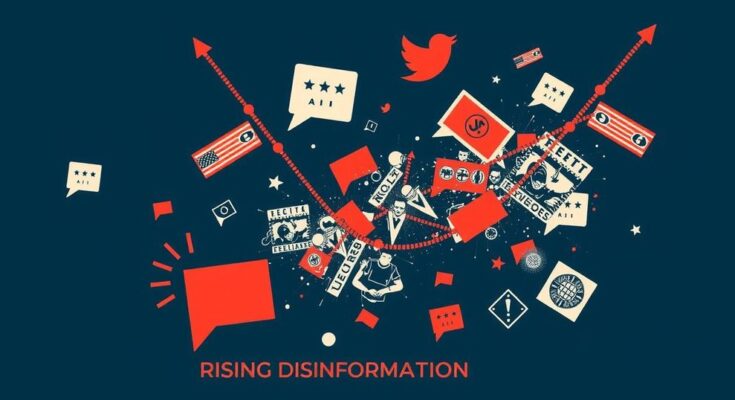As the election nears, the level of disinformation has reached unprecedented heights, severely impacting public confidence in American democracy. Notable examples of this disinformation campaign include false allegations against the Democratic vice-presidential nominee and the viral spread of a fabricated video. Foreign adversaries are exploiting these narratives to undermine trust in American democratic processes, compounded by partisan figures amplifying divisive rhetoric. The overarching consequence is an erosion of trust in the integrity of elections and political discourse.
As the election approaches, disinformation is at unprecedented levels, significantly eroding public confidence in the integrity of America’s democracy. This surge of false narratives, both domestic and international, has instigated a devastating impact on political discourse, with social media platforms becoming hotbeds for misleading information. A prominent example involves the false allegations made against the Democratic vice-presidential nominee, which were propagated by an individual connected to Russian propaganda efforts. A fabricated video allegedly portraying a victim has gone viral, amassing over five million views on X, a platform led by Elon Musk, who is known for supporting former President Donald Trump and reviving unfounded claims regarding the election results. For decades, disinformation has been an ingrained aspect of U.S. presidential elections; however, current instances surpass previous occurrences, as documented by officials and researchers. The repercussions of these disinformation campaigns on the impending election remain uncertain, but they have already tainted the political dialogue surrounding the major party candidates and jeopardized the foundational notion of fair and free elections. Foreign adversaries, specifically Russia, Iran, and China, have exploited existing narratives to depict American democracy as ineffective and untrustworthy. This exploitation is further compounded by politicians and media figures who, for their partisan gain, propagate and amplify divisive rhetoric. “Very simply, they are looking to undermine American trust in our democratic institutions and the election specifically, and to sow partisan discord,” remarked Jen Easterly, Director of the Cybersecurity and Infrastructure Security Agency, highlighting the unified goal behind diverse influence operations.
The increasing wave of disinformation, particularly during election cycles, presents a critical threat to the democratic process in the United States. With the aid of social media and digital platforms, false narratives can rapidly gain traction and influence public opinion. Historical patterns demonstrate that disinformation has always accompanied presidential elections in America; however, the current landscape reveals a profound escalation in the scale and impact of such misinformation. This phenomenon not only affects public perception of candidates but also corrupts the fundamental principles of democracy, fostering distrust in electoral integrity.
In conclusion, the current disinformation crisis poses a serious challenge to American democracy as the election nears. The proliferation of false information, both from domestic and foreign sources, undermines electoral integrity and erodes the public’s trust in democratic institutions. Without substantial efforts to combat this tide of misinformation, the political landscape may continue to suffer, jeopardizing the very essence of fair and democratic elections in the United States.
Original Source: www.nytimes.com




